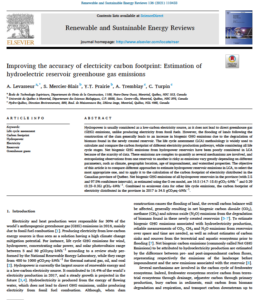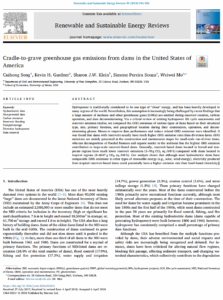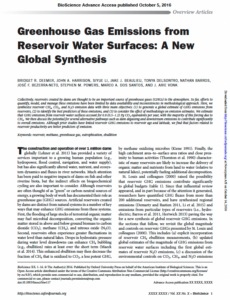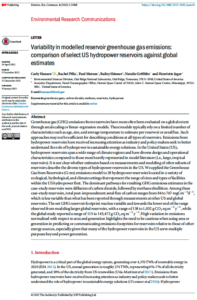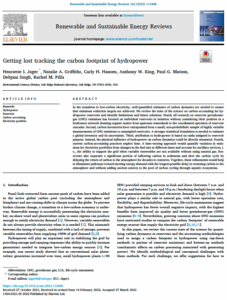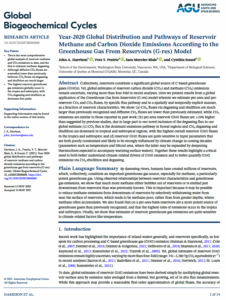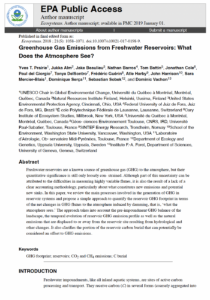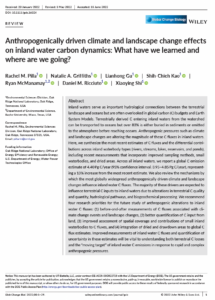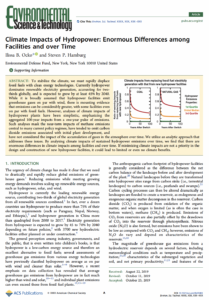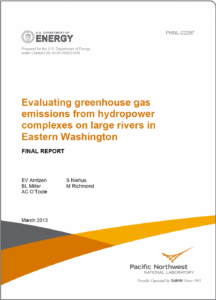Resources
Search
Publication date range
Academic ArticlesReservoir Emissions
Published 10/16/2020
Abstract: Hydropower is usually considered as a low-carbon electricity source, as it does not lead to direct greenhouse gas (GHG) emissions, unlike producing electricity from fossil fuels. However, the flooding of lands following the construction of the dam generally leads to an increase in biogenic GHG emissions due to the degradation of biomass found in […]
Academic ArticlesReservoir Emissions
Published 7/1/2018
Abstract: Hydropower is traditionally considered to be one type of “clean” energy, and has been heavily developed in many regions of the world. Nevertheless, this assumption is increasingly being challenged by recent findings that a large amount of methane and other greenhouse gases (GHGs) are emitted during reservoir creation, turbine operation, and dam decommissioning. Via a critical review of […]
Academic ArticlesReservoir Emissions
Published 10/5/2016
Abstract: Collectively, reservoirs created by dams are thought to be an important source of greenhouse gases (GHGs) to the atmosphere. So far, efforts to quantify, model, and manage these emissions have been limited by data availability and inconsistencies in methodological approach. Here, we synthesize reservoir CH4, CO2, and N2O emission data with three main objectives: (1) […]
Academic ArticlesReservoir Emissions
Published 1/9/2023
Abstract: Greenhouse gas (GHG) emissions from reservoirs have most often been evaluated on a global extent through areal scaling or linear-regression models. These models typically rely on a limited number of characteristics such as age, size, and average temperature to estimate per reservoir or areal flux. Such approaches may not be sufficient for describing conditions […]
Academic ArticlesReservoir Emissions
Published 7/1/2022
Abstract: In the transition to low-carbon electricity, well-quantified estimates of carbon dynamics are needed to ensure that emissions reduction targets are achieved. We review the state of the science on carbon accounting for hydropower reservoirs and identify limitations and future solutions. Nearly all research on reservoir greenhouse-gas (GHG) emissions has focused on individual reservoirs in isolation […]
Academic ArticlesReservoir Emissions
Published 5/26/2021
Abstract Collectively, reservoirs constitute a significant global source of C-based greenhouse gases (GHGs). Yet, global estimates of reservoir carbon dioxide (CO2) and methane (CH4) emissions remain uncertain, varying more than four-fold in recent analyses. Here we present results from a global application of the Greenhouse Gas from Reservoirs (G-res) model wherein we estimate per-area and […]
Academic ArticlesReservoir Emissions
Published 1/1/2019
Abstract: Freshwater reservoirs are a known source of greenhouse gas (GHG) to the atmosphere, but their quantitative significance is still only loosely con- strained. Although part of this uncertainty can be attributed to the difficulties in measuring highly variable fluxes, it is also the result of a lack of a clear accounting methodology, particularly about what […]
Academic ArticlesReservoir Emissions
Published 7/20/2022
Abstract: Inland waters serve as important hydrological connections between the terrestrial landscape and oceans but are often overlooked in global carbon (C) budgets and Earth System Models. Terrestrially derived C entering inland waters from the watershed can be transported to oceans but over 83% is either buried in sediments or emitted to the atmosphere before reaching […]
Academic ArticlesReservoir Emissions
Published 11/14/2019
Abstract: To stabilize the climate, we must rapidly displace fossil fuels with clean energy technologies. Currently hydropower dominates renewable electricity generation, accounting for two thirds globally, and is expected to grow by at least 45% by 2040. While it is broadly assumed that hydropower facilities emit greenhouse gases on par with wind, there is mounting evidence that emissions can be considerably greater, […]
ReportsReservoir Emissions
Published 3/1/2013
Abstract: Inland water bodies, such as freshwater lakes, are known to be net emitters of carbon dioxide (CO2) and methane (CH4). In recent years, significant greenhouse gas (GHG) emissions from tropical, boreal, and mid-latitude reservoirs have also been reported. At a time when hydropower is increasing worldwide, better understanding of seasonal and regional variation in GHG emissions is needed in […]

